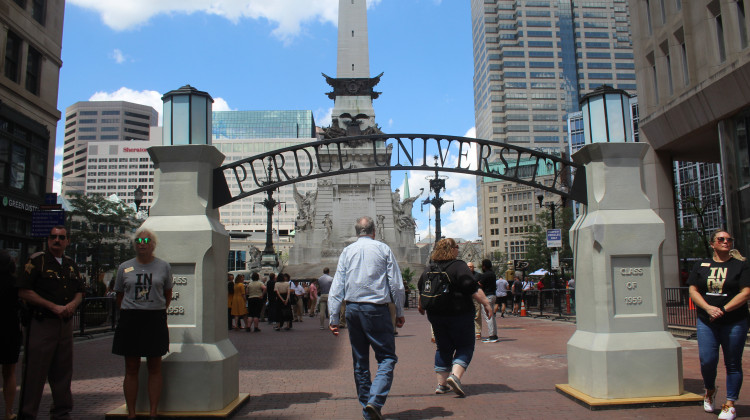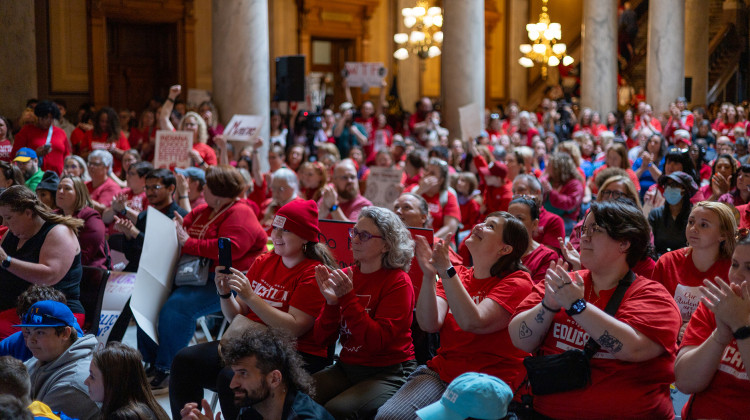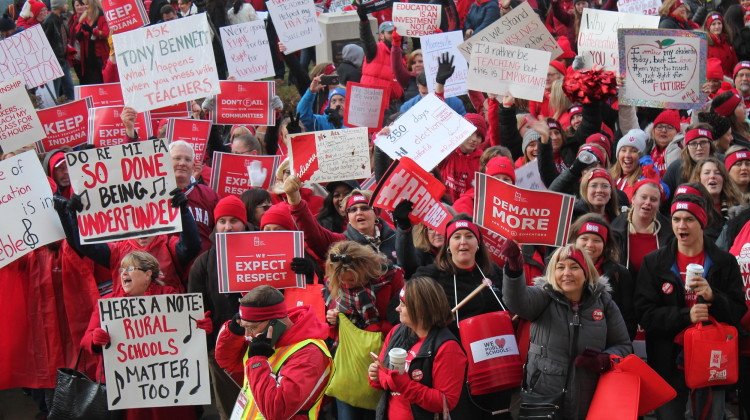This story was updated.
The Indianapolis Public Schools Board unanimously approved a resolution Tuesday to place a $410 million capital referendum on the May 2023 primary ballot to fund the construction of a new elementary school and renovations at more than two dozen other buildings.
Next week, the board is expected to vote on another property-tax levy for the same ballot: an operating referendum to generate $413.6 million over eight years, or $51.7 million annually, to pay for teacher compensation, academic program expansion and fund sharing with charter school partners. This would replace the current operating referendum approved by voters in 2018.
If each referendum makes it to the ballot and passes, homeowners of a median-valued property will pay about $6 more per month in property taxes, according to the district.
IPS Superintendent Aleesia Johnson has said the new tax dollars are needed to fund Rebuilding Stronger, the expansive district overhaul approved last month by the school board. The plan is centered around new academic, athletic, and performing arts programming at elementary and middle schools in an effort to boost the academic performance of Black and Hispanic students.
But opposition is growing to the district’s proposed referendums. Last week Marion County charter school leaders called on IPS to equitably share the funds with its innovation charter partners and other public charters in Indianapolis, totaling 52 schools.
During Tuesday’s board meeting community members shared the same demands.
“Why would a junior in high school be here talking to you today when I should be studying for finals,” asked Elazia Davison, a student at BELIEVE Circle City charter high school. “I'm here because you are actively robbing me of equal opportunity. Just as IPS wishes to do to the other scholars that attend my school and many others.”
Last week, Johnson said property-tax funds would not be shared with non-IPS affiliated charters.
Growing opposition
In November 2021, IPS agreed to share a portion of its 2018 operation referendum funds with 25 innovation charter schools that partner with the district. Charter schools are not eligible to receive property-tax referendum funds directly from voters, but they can receive them if a public school district agrees to share the revenue. Now the schools receive $500 per in-district resident student, a total of roughly $27.5 million for the remainder of the referendum. But that’s only a fraction of the $1,800 traditional, in-district IPS students receive.
If a new operation referendum is approved by voters, IPS will increase the shared amount to $650 per in-district resident student.
But education advocates are concerned per-student funding in IPS-run schools would increase by around $2,300 while innovation schools would get far less and independent charter schools receive none.
More than 30 people spoke at the Tuesday school board meeting and said they would only support the operating referendum if a larger portion of the funds are shared. Now they want the district to postpone its vote on the operating referendum until Johnson and school board members find a way to equitably distribute the funds.
“I have been to schools that didn't have computers, enough transportation support and families that couldn't always get their kids to school,” said Seige Anderson, a tenth grader at the innovation charter Herron Riverside High School. “I know school supplies are important, and my school gives backpacks, uniforms and resources. Every school can't do this. The school type should not determine how much money they receive, no matter if it is a charter school.”
And the district needs community support in order to pass these levies. In the November midterm election, four of the eight Indiana school districts with property-tax levies failed to win voter approval.
Here are the basics of the proposed $823.6 million IPS property tax levies:
Capital Referendum
If approved, the local property tax levy for the capitol referendum would be no more than $0.2066 per $100 of assessed value. It would add $3.18 per month in property taxes to homeowners of a median-valued property.
The funds would cover the cost of a new $34.6 million facility for Joyce Kilmer School 69 and improvements at around 20 schools – including $66.4 million at Arlington Community Middle School for building and athletic upgrades and $39.6 million at the former Thomas Carr Howe building to prepare it to reopen as a middle school.
Operating Referendum
If approved, the local property tax levy for the operating referendum would switch from $0.19 to no more than $0.25 per $100 of assessed value on Jan. 1, 2024. It would generate $51.7 million annually and add $2.60 per month in property taxes to homeowners of a median-valued property.
The bulk of the revenue would go toward teacher pay. Last year the district provided teachers with a 3 percent compensation increase, making IPS one of the highest paying school districts in Marion County.
Indiana property taxes are capped at assessed value rates based on the type of property: 1 percent for owner-occupied homes; 2 percent for other residential properties and farmland; and 3 percent for all other property. But if voters approve a local referendum, a property tax bill can exceed the cap and the extra taxes go to the local school district.
IPS’ previous referendum, cost cutting measures
Four years ago, IPS announced a plan to ask taxpayers to approve two property-tax referendums worth $936 million, but the request received very little support. In response, the district lowered the amounts to an eight-year, $220 million general spending and $52 million for capital projects referendums that were overwhelmingly approved by voters.
IPS also agreed to partner with the Indy Chamber to dramatically cut its budget by 2026 in exchange for the Chamber’s support for the IPS referendum. Since then, the district has reduced spending by $261 million according to a 2021 report. That’s nearly $67 million less than projected.
Johnson said the district and the chamber over projected how much money they would save since they estimated that all students would switch to IndyGo transportation, rather than its current model of certain high schoolers using public transit.
The Indy Chamber declined to comment about whether it will support the district’s proposed 2023 referendums.
Contact WFYI education reporter Elizabeth Gabriel at egabriel@wfyi.org. Follow on Twitter: @_elizabethgabs.
 DONATE
DONATE







 Support WFYI. We can't do it without you.
Support WFYI. We can't do it without you.